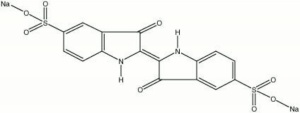Indigo carmine
Description
A dark bluish purple, synthetic, water soluble version of indigo. Indigo carmine, or Saxon blue, is composed of the sodium sulfonate salt of indigotin. First prepared in 1740 by Barth, it was the earliest synthetic acid dye. Indigo carmine was used to color wool and silk. It is not lightfast and has poor washfastness. Indigo carmine is still used for coloring nylon sutures, food, and drugs. It is also used as a biological stain and as a detection reagent for nitrates and chlorates.
Synonyms and Related Terms
Pigment Blue 63 (aluminum salt); Natural Blue 2; Acid Blue 74; CI 73015; sodium indigotin disulfonate; indigo disulphonic acid (Br.); indigocarmim (Port.); indigocarmine; soluble indigo blue; indigotine
Other Properties
Soluble in water. Slightly soluble in ethanol. Discolors in acids.
| Composition | C16H10N2O8S2.2Na |
|---|---|
| CAS | 860-22-0 |
| Melting Point | > 300 |
| Molecular Weight | mol. wt. = 466.36 |
Hazards and Safety
Mallinckrodt Baker: MSDS
Additional Information
° A.Scharff, "Synthetic dyestuffs for textiles and their fastness to washing" in ICOM Preprints, Lyon, 1999. p.654-660.
Authority
- A.Scharff, 'Synthetic dyestuffs for textiles and their fastness to washing', ICOM-CC Preprints Lyon, Getty Conservation Institute, Los Angeles, 1999
- Colour Index International online at www.colour-index.org Comment: Acid Blue 74; CI 73015
- Helmut Schweppe, Schweppe color collection index and information book Comment: CI 75781 and 73015
- The Merck Index, Martha Windholz (ed.), Merck Research Labs, Rahway NJ, 10th edition, 1983 Comment: entry 4978
